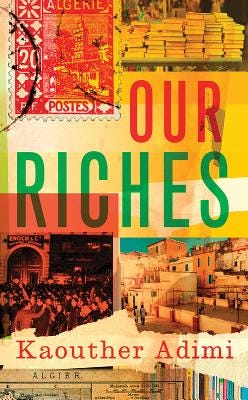'Our Riches': For the love of books
A novel retells publisher and bookseller Edmond Charlot's story.
This post contains an affiliate link or links. If you use a link to buy a book, I may earn a small commission. You can find all the books that have been featured in this newsletter in my Bookshop store.
When I took AP French in high school, the teacher assigned the class to read Albert Camus’ classic novel “The Stranger” — that is, “L’etranger,” in its original French. Though the novel is set in Algeria, either the teacher didn’t mention, or I’d forgotten, that Camus was born and raised in Algeria, a French colony throughout his lifetime. Not until coming across him in Kaouther Adimi’s 2020 novel, “Our Riches,” did I finally make (or perhaps make again) the connection.
I picked up “Our Riches” as part of an effort to read more global literature this year. In hindsight, I could have just re-read Camus. But I’m glad to have instead read “Our Riches,” a fascinating story inspired by true events, as the movie teasers say.
Edmond Charlot was barely into adulthood when he opened a lending library and bookstore in his birthplace of Algiers, the Algerian capital, that he named Les Vraies Richesses, or Our True Wealth. The idea didn’t quite come out of nowhere; his father worked for the French publisher Hachette and helped supply some inventory. Les Vraies Richesses swiftly became a gathering place for literary and artistic types, including a young Camus. Charlot became Camus’ first publisher, starting with a play by Camus and several friends that had been censored by the Algerian government.
Like Charlot and Camus, the author who channels their friendship grew up with her feet in two worlds, one Algerian and one French. “Our Riches” also contains multiple perspectives: We move back and forth between Charlot’s Algiers, represented by his purported journal, and the Algiers of 2017, when a young man with zero interest in books is dispatched to clear out the store, now destined to become a beignet shop. An anonymous chorus weighs in, theatrically, from time to time.
Adimi’s book is slim — well under 200 pages — but brimming with cultural, societal and historical insights. At its center is a heady mix of talent, Camus only one star in a literary firmament. But Charlot struggles to juggle publishing and bookselling, his lack of financial acumen landing him and Les Vraies Richesses in some unfortunate situations. World War II delivers a body blow to the business, with ink and paper in extremely short supply. Things do not calm down after the war; I learned for the first time in reading this book about the horrifying 1961 police massacre of Algerians in Paris.
Charlot died in France in 2004, eulogized by the Independent as “an impassioned bibliophile and literary enthusiast.” “Our Riches” feels like a fitting tribute.


